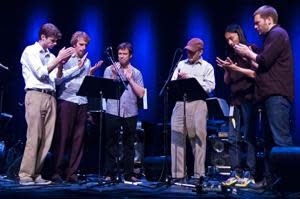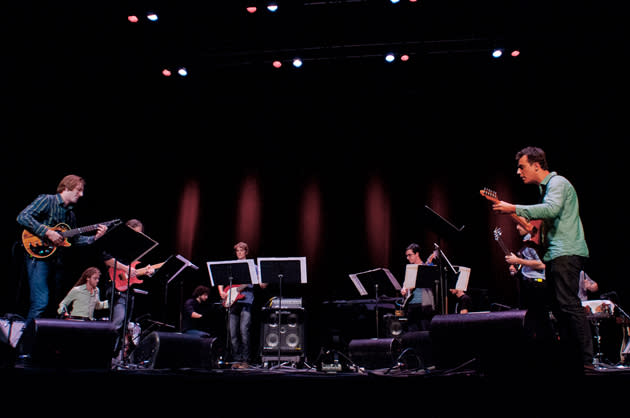 Maximum Performance
Maximum PerformanceReich & Roll: The 11th Annual Bang on a Can Summer Festival Marathon

People sometimes ask why I drive all the way to the back roads of the Berkshires for the finale of Banglewood, the pet name for Bang on a Can's Summer Festival and Institute. Surely that's not the only place one can hear adventurous contemporary music.
Well, maybe not, though most of us would likely have to travel somewhere distant to hear the phantasmical vocalizing into an amplified piano of George Crumb's "Ancient Voices of Children," or even a sample of the other 16 works that were performed at Bang on a Can's 11th Annual Summer Festival Marathon.
There's just nothing quite like it. As it is often pointed out, the six hours of performances are like a musician's dozen of concerts rolled into one. And this year's superb Banglewood finale ran closer to seven hours as it helped to celebrate Bang on a Can's 25th year in high sonic style.
EXPRESSWAY TO YR SKULL. The Massachusetts Museum of Contemporary Art (MASS MoCA), tucked away in the western hills of the Bay State a few miles from Tanglewood, is a perfect place for BOAC's summer residency. As I approach the entrance, the signature upside down trees, signs in the curiosities store window announcing "imported faux pas, $6 a pound" and "long-lasting grudge 65 cents ea.," and a homemade amusement ride created from bike racks that is half-Flying Tigers, half-chairlift, set an appropriate mood in the (finally) waning drizzle.
As luck would unfortunately have it, the backups, accidents and flooding on the drive up -- extreme even for the New York Thruway -- meant that I could catch only the last, demanding movements of Crumb's "Voices." If only the thruway traffic had been pushed along by the rush-hour-riff locomotion of Steve Reich's "Cello Counterpoint."
Usually, the eight (count 'em) cello parts of this seminal composition by minimalism pioneer Reich (this year's special guest) are divvied up between live musicians and pre-taped recordings. But on stage there are eight live cellists passing off notes and working the counterpoint swoons, playing as though they are required to leave the stage with bloodied fingers. Next up is a piece by San Francisco composer Dan Becker, "S.T.I.C.," which stands for Sensitive To Initial Conditions -- it's a "chaos theory" thang -- which launches flute, clarinet, strings and piano into flights of percussive fancy.
For this year -- my tenth BOAC Summer Festival -- they've abandoned the auditorium's risers and with them the good sight lines. So when I spot a chance to jump up to the second row, right side, for Lou Harrison's "Violin Concerto," I hop on it. Harrison, a pioneering microtonal composer and contemporary of John Cage, wrote all of his vocal music in the failed international language of Esperanto. Now adapt that mindset to Todd Reynolds' dramatic, passionate violin and the wild-ass Bang on a Can percussion group (flower pots, gong, double bass on its side hammered like a dulcimer) and you might understand why it sounds to me like a pan-Asian marching band messin' 'round on the back porch. Violin-fueled American gamelan, if you will.
TEACH YOUR CHILDREN WELL. As the Olympic-level stage hands clear the stage for the next ensemble, I reflect on the fact that, even though they're officially "students," the 36 fellows who have come from four continents to immerse themselves in BOAC's modern music program this summer are of some of the most gifted and passionate players you'd ever want to hear. For three weeks, they write, perform, think about, talk about, eat and sleep recent music that has changed the world. Meanwhile, the introduction for David Crowell's "Waiting in the Rain for the Snow" picks up on the theme circling in my brain. "While some programs prepare musicians to go out into the existing world, [the BOAC Summer Institute] prepares them to go out into a world they will make."
Before leaving to join a tour of Philip Glass' "Einstein on the Beach," saxman Crowell worked with five of the summer fellows for their marathon performance of his "Waiting … ." They deliver in spades, as the melodic low groan of the double bass and bass clarinet move against gleeful percolating flute, electric guitar, clarinet and piano. As the repetitions resolve dissonant irritations with neo-classical elegance, it's easy to hear why Glass thought Crowell would be a good fit for his minimalist zeitgeist.
It's 6:15, and unofficially the marathon is running about 15 minutes late. Usually I'll grab a bite before the marathon's second musical wave, but I stay planted for the premier of faculty tenor saxophonist Ken Thomson's "Incoming." I'm glad I did. The multi-textural work is a terrific tension-release mash pushed by a growling sax and grunging guitar to a King Crimson-esque boiling point.
My gut is growling louder, but before I take a break I need to hear Hans Abrahamsen's "Schnee, Canon 2B," a nine-minute excerpt from the "cult" piece that works off icicle-like sound imagery that mirrors its name (schnee is Danish for snow). "Schnee" is a prime example of the school of New Simplicity, a variation on "phase pieces" where individual parts move in and out of sync. The instruments are tuned down by one-sixth, the piano strings are "prepared" with sticky tack, and two sheets of paper provide a medium for some of the most interesting percussion work of the evening. The timing is described as "8 against 9 or 9 against 8." Or, as I translate, "spasm-ing instruments that sound like they're trying to run away from or into each other." What's not to love? And I do.
I hate to break for food, but even music snobs gotta eat. Besides, I think the building gurgle of my stomach will no longer be mistaken as just another part of the music on the upcoming "Okanagon," by Giacinto Scelsi, or Pauline Oliveros' "The New Sound Meditation - for voices." So I Iisten to harp, tam tam, bass, and the vocal meditations that are piped into the museum's café as I inhale a summer squash quiche and peruse this year's BOAC t-shirts in the gift area.
I'm back to my seat in time for a bristling "Sunray" by David Lang, one of my fave Banging All-Stars, and the most unusual "Shy Girl Shouting Music" by Missy Mazzoli, which ranges from blurting guttural voicings to operatic high notes but really doesn't take me anywhere special. That's OK, the rest of the night will.
THE BYRDS MEET MARTIAN TREEWATCHERS. The 8-10 pm portion of the evening is beginning at 8:35, making sure that this year's marathon will be working overtime. No one is complaining, least of all me, especially as the premier of Jeffrey Brooks' "After the Treewatcher," commissioned by BOAC, kicks off the segment. Minneapolis composer Brooks, confined to a wheel chair, and BOAC kingpin Michael Gordon explain how the piece is meant as a reflection on how Brooks remembered Gordon's "Treewatcher," since Gordon insisted that Brooks create his variations without the original score. The result is burning, chiming, percussive, soaring -- hyped-up minimalism moving gorgeously through other worlds. I suppress the inclination to describe it as Roger McGuinn's 12-string guitar leading the Martian Symphony Orchestra on a baroque gamelan march to a seaside funeral pyre. OK, maybe I didn't resist so well, but I am at a loss on how to otherwise describe Brooks' fantastic new work.
I know Steve Reich's "Eight Lines," now cascading from the stage, very well; it can be as invigorating as it is trance-inducing, and I've used it as both as a lullaby and a morning alarm. Here, the repeated riffs of the piano, woodwinds, and strings are beautifully heaving against and warmly blanketing each other as they cycle through shifting moods. My ears bounce from flute to viola to piano, picking out the melodies as they're transformed, traded and reprised among the players. Pretty wonderful.
BOAC's Julia Wolfe introduces "Lick," the very first piece she wrote for the All-Stars, as an attempt at playing with and messing up the sense of groove. When the rollick of its tone bombs meets up with its serious industrial-strength pound, the only thing to do is to step aside and let "Lick" have its way. Cool.
The evening moves from metal machine music to Bible verse, sort of, with a Michael Gordon composition that drew its name from Genesis: "Four Kings Fight Five." According to Gordon, I'm listening to its nine musicians in a "discussion" of where the composition's beat is and who is actually holding it. With Brad Lubman again conducting, the battering-ram-of-sound ensemble piece is majestically discordant. It's an angry, grappling tussle of lurching notes and rhythms in which neither the reeds, strings, guitar, keys nor drums ever establish complete domain -- though an eerie viola melody is allowed to shine through, softly, before it all slides back into a bubbling cat fight.
CLAP YOUR HANDS SAY YEAH. It's now 25 minutes past the planned end time of 10 pm, and I've just heard four great modern music pieces, any of which could have easily been the climax sending the 2012 BOAC Summer Festival off to the champagne after-party. But now Steve Reich himself is on stage to start off the real run to the finish with "Clapping Music," for which he, BOAC's Dave Cossins, and four fellows explore rhythmic counterpoint with some serious, well, hand clapping, setting up the smash-bang ending: Reich's rockist "2x5."
"There are lots of guitars on this next piece," Michael Gordon quips to Reich, whose music largely relies on keyboards and percussion. "So, what happened?" Reich responds that he had long been attracted to the sound of the electric bass, which developed into a desire to work with rock ensembles, which lead quite obviously to electric guitars. "Instrumentation is my inspiration," Reich says, "so this is my piece for rock instruments."
Using effects units to mimic the unnaturally high tones Reich drew from the guitars using plug-ins while setting up the piece in composition software, the two rock quintets -- 2 x 5 -- square off against each other. With driving basses and drumkits and the morphing effervescence of Reich's piano lines pumping out pummeling rhythms, the guitar amplifiers blast chiming figures that ring more like heavenly harmonics rather than the full-on chordings that are actually being played by the four guitarists. "2x5" is bright, lively and fresh, vintage Steve Reich, and a great send-off until next year.
All photos copyright by Ivan Singer Photography, ivansinger.com.






